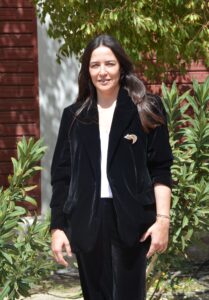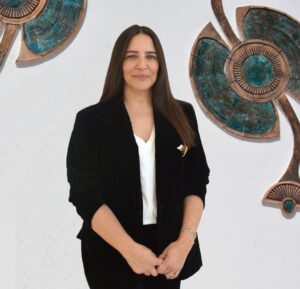
In this issue, we shine a spotlight on the Near East University Dean of Students Office — a central pillar of support, guidance, and development for all students. We also had the pleasure of speaking with the Dean of Students, Prof. Dr. Dudu Özkum Yavuz, who shared insights on student well-being, inclusive support systems, and the importance of building a vibrant campus culture.
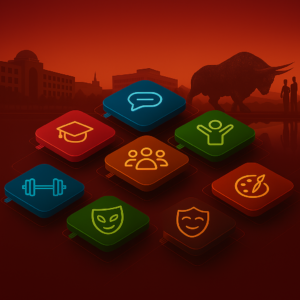
Could you briefly introduce the mission and responsibilities of the Dean of Students Office at Near East University?
The Dean of Students Office at Near East University is a student-oriented academic support unit that provides guidance, coordinates services, and facilitates communication between students and the university administration. It is responsible for offering various forms of assistance to students throughout their academic journey, helping to resolve personal, academic, and social issues, and strengthening the student's sense of belonging to the university. The office also plays an active role in organizing social, cultural, artistic, and sports activities that contribute to the personal development of our students.
How does the Dean of Students Office contribute to enhancing students’ academic, social, and personal development?
A key role of the Dean of Students Office is to support the holistic development of students. The Office regularly organizes training, seminars, conferences, and fieldwork activities to strengthen student awareness, competencies, and social responsibility. In collaboration with other university units, it ensures that students are actively engaged in university life and that their voices are heard.
What is your personal vision in leading the Dean of Students Office, and what values guide your approach?
I believe in the importance of contribution of students to their own extracurricular and social life within the University. As such, I think that our most important goals are to increase student engagement and interactions, both with each other and with the Dean of Students Office, in such a way that their voices are heard and their input valued. At the same time, I strive to make sure that the activities conducted are appropriate and fulfilling for the student body. We aim to conduct all these activities in a way that promotes collaboration, cultural enrichment and intercultural harmony among our students.
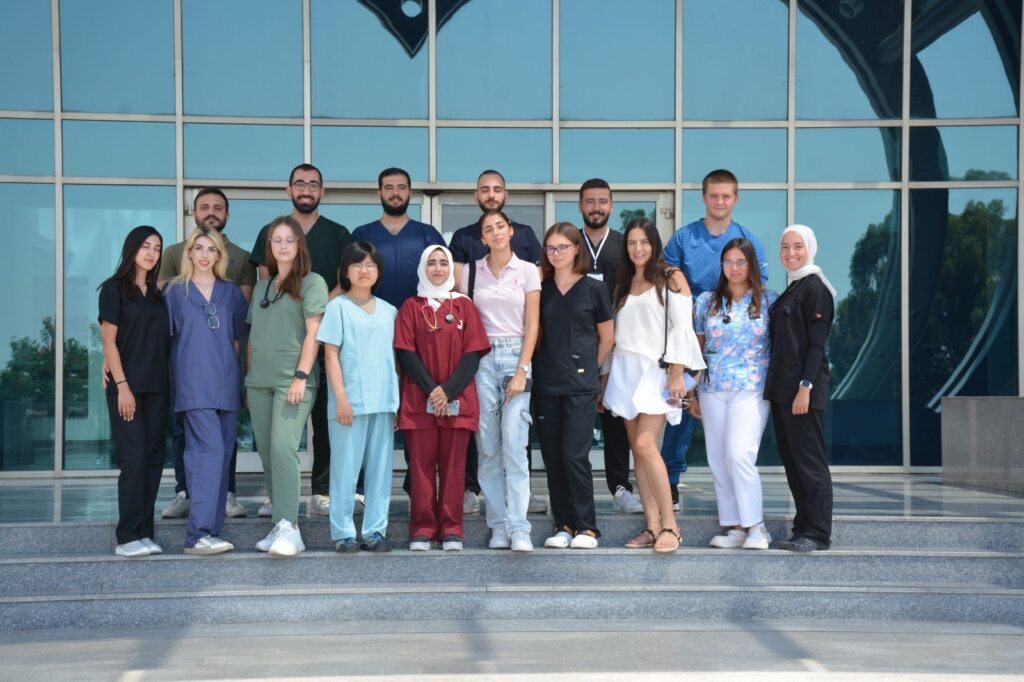
Student clubs and extracurricular activities are a vital part of university life. How does your office support and coordinate these initiatives?
Near East University employs a holistic educational model that supports students not only in academic areas, but also in their social, cultural, and personal development. In this context, more than 80 student clubs operate under the coordination of the Dean of Students Office, offering a wide platform where students can develop themselves in line with their interests.
Throughout the year, student clubs organize seminars, conferences, workshops, debates, camps, and picnics that contribute to the development of students' communication, leadership, and organizational skills. These clubs also play an essential role in fostering cultural and artistic engagement, raising social awareness through community service projects, and supporting scientific activities that help students become active and responsible individuals.
The scope of activities organized by student clubs is not limited to the campus; cultural trips to cities such as Kyrenia, Nicosia, and Famagusta enable students to explore the historical and cultural fabric of the region, further enriching their university experience.
International student clubs also contribute significantly to the university's global vision. These clubs, actively run by students from various countries, promote multicultural interaction and social engagement, while also providing opportunities for students to represent Near East University at international congresses, symposiums, festivals, and exchange programs. In doing so, students gain global perspectives, improve their intercultural communication skills, and enhance their international presence.
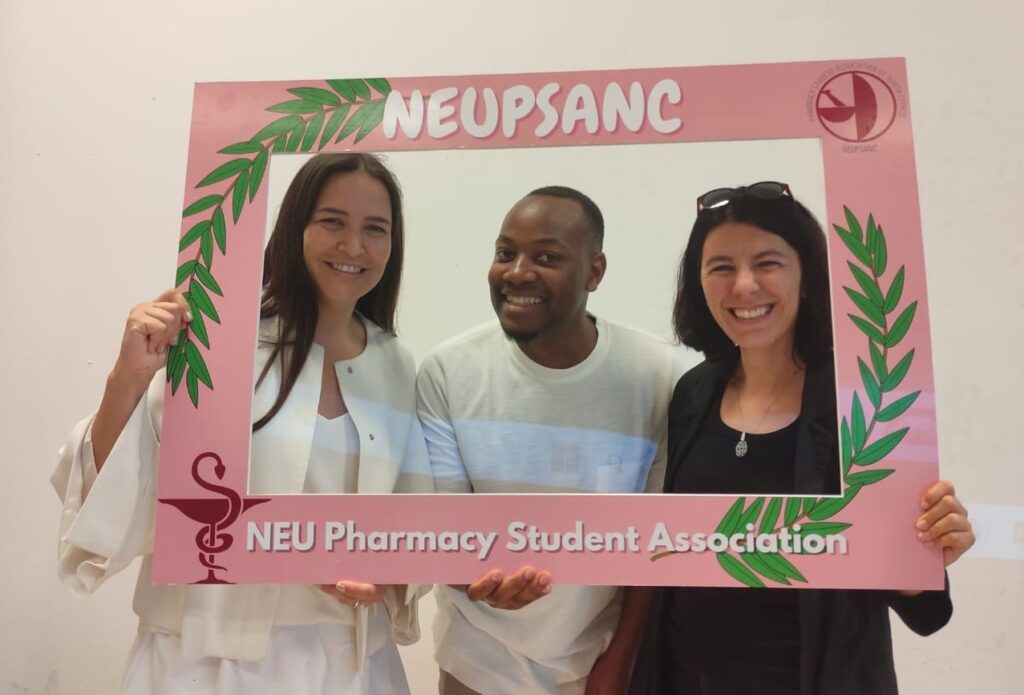
All these activities organized through student clubs and societies serve as powerful tools to strengthen not only the academic competencies of students, but also their social and cultural capabilities—ultimately preparing them to become confident, well-rounded individuals. Via this multifaceted approach, Near East University offers its students a rich university life and an educational experience that meets international standards.
In recent years, student well-being and mental health have become increasingly important. How is this reflected in your work?
Of course, we value the well-being of our students, whether physical or mental, deeply and passionately. Our university has programmes and centres such as PDRAM to promote and maintain mental health by providing psychotherapy and assistance services. In addition, our very own Near East University Hospital is a fully-equipped hospital, capable of providing high quality of physical health assistance to our students. Our Office collaborates with the Rectorate and the Hospital to rapidly provision assistance to the students who find themselves in need of such assistance, through multiple units under the Office of the Students Dean.
In order to ensure equal access to opportunity, we have been instrumental in the founding of the Disabled Student Support Unit, that provides our disabled students the resources necessary to have access to equal number and quality of opportunities as all our other students.
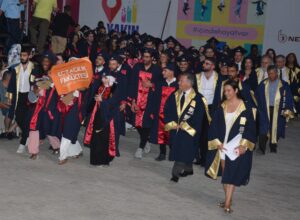
Could you share a memorable moment or feedback that made you feel particularly proud in your role as Dean of Students?
A moment of particular importance for me was the graduation ceremony of the last year, where I saw the graduation of in excess of 4,000 students. I witnessed their interactions, their intercultural exchanges and cumulative experiences throughout the previous years. I was emotional and deeply proud of my students for having accomplished everything they did during their studies and was grateful to have been a part of their accomplishments over that period of time.
Looking ahead, what are some of your priorities or upcoming projects aimed at improving student life?
Our priorities and upcoming projects in the future will of course maintain focus on promoting the academic excellence, extracurricular activities and the social collaborative capabilities of our students. We will strive to implement and organize more educational seminars, webinars, students’ congresses and other academic activities to provide ever greater access to these resources by our students.
At the same time, we will further increase our collaboration with our various Faculties, perhaps giving more attention to inter-Faculty collaborative projects.
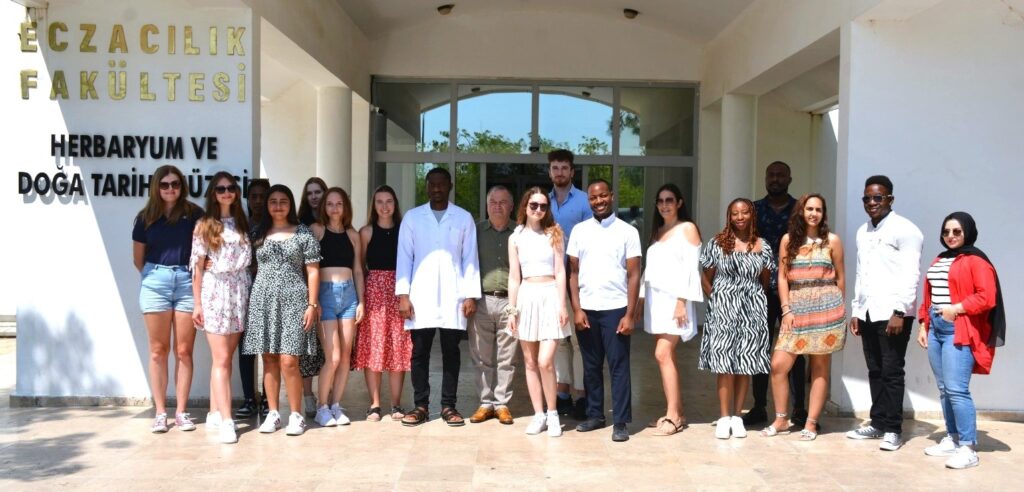
The Dean of Students Office encompasses several sub-units. Could you provide an overview of these units and their main functions?
Student Counseling and Communication Unit
This unit assists students with all kinds of issues that may arise due to unexpected situations that prevent them from fulfilling their academic responsibilities. Through the online petition system, students can request assistance on matters such as tuition refunds, academic procedures, job applications, dormitory issues, and financial support. Students are informed via email or face-to-face and are directed to the appropriate departments such as the Rectorate, International Student Affairs, academic departments, and the Dormitory Directorate.
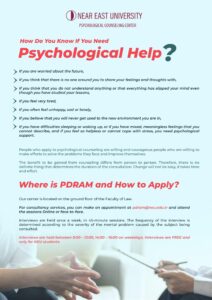
Psychological Counseling Unit
Students seeking counseling are referred to the Psychological Counseling, Guidance and Research Center (PDRAM) through the Dean of Students Office. In cases requiring psychiatric evaluation, students may be referred to the Psychiatry Clinic of Near East University Hospital. Professional support is provided for issues such as stress, depression, anxiety, adaptation, trauma, loss, social phobia, and more.
Disabled Student Support Unit
Near East University is committed to providing equal opportunities to all students, including those with special needs. Academic and social support services include additional tutoring, accessibility accommodations, and exam arrangements. Collaborations with the Disability Rights Monitoring Committee (EHİK) and the Barrier-Free Cinema and Activity Center support training and awareness projects.
International Student Office
This office supports the social and cultural integration of international students and provides information and guidance in cooperation with other university units. It also plays a role in organizing cultural exchange events and student engagement activities.
Alumni Communication Office
The Alumni Center keeps records of graduates, tracks their career progress, and creates a platform for social and professional interaction between alumni and the university. It collaborates with the NEU Alumni Association (YADOMED) to maintain strong ties with graduates and offers opportunities for involvement in volunteer projects.
Career Planning and Counseling Unit
This unit supports students in preparing for professional life by organizing events such as career days, workshops on interview techniques, and CV writing. It helps students discover their talents and define their career goals while connecting them with internship and job opportunities.
Dormitory Coordination Office
The office provides students with information about housing, helps solve problems related to dormitory life, and supports the transition of new students into campus life.
Student Clubs and Events Coordination Center
With more than 80 active student clubs, this center enhances students’ social, cultural, and personal development. It organizes seminars, cultural trips, and international events while providing guidance on club participation and representation in national/international platforms.
Student Council of Near East University
The Student Council represents the voice of students in university administration and supports dialogue between the administration and the student body.
Student Disciplinary Committee Secretariat
This office facilitates the procedures of the university’s student disciplinary board, ensuring due process and transparency.
Satisfaction and Feedback Unit
Functioning under the Board of Trustees, this unit enables students to submit their suggestions, complaints, and feedback through an online system. It aims to strengthen the bond between students and administration with a transparent and responsive approach.
Social Responsibility Projects Unit
The unit encourages active student participation in volunteer-based initiatives focusing on literacy, social awareness, and solidarity. It promotes civic engagement and supports cooperation with public institutions and NGOs.
Orientation Program Committee
Organizes welcome programs for new students, including campus tours, seminars, and cultural trips to help them adapt to university life and integrate into the NEU community.
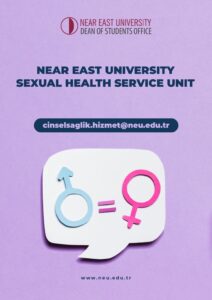
Sexual Health Services Unit
Provides education and counseling services on sexual health, reproductive rights, and access to reliable health information. Works in collaboration with clinical services for further support when needed.
